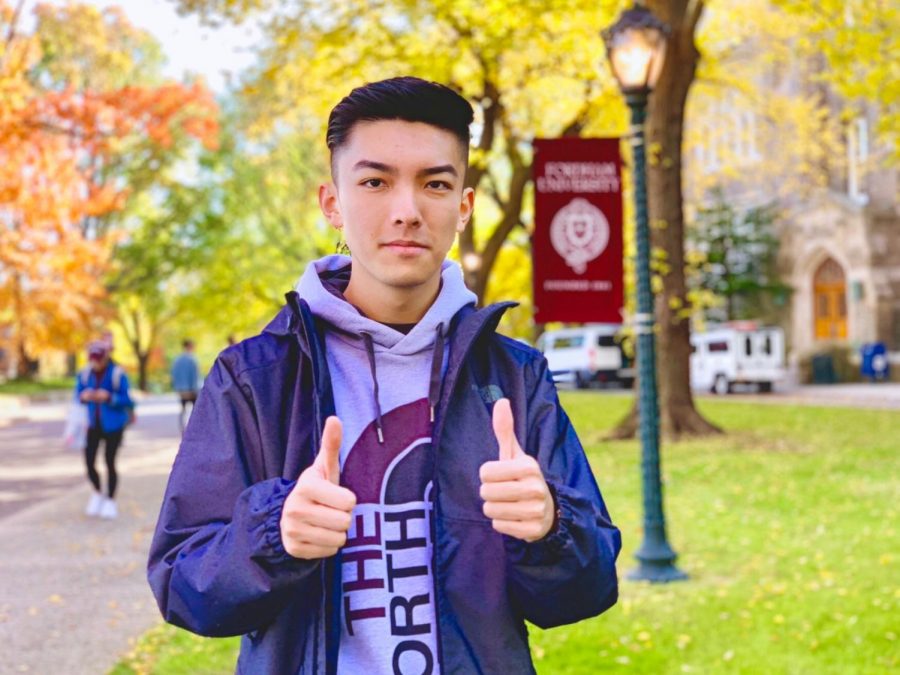Presidential Candidates Present Radically Opposing Ideas in USG Elections
March 27, 2019
As election day for the 2019-20 United Student Government (USG) officers approaches, two presidential candidates have emerged running on nearly opposite platforms. Before students cast their online ballots on April 2, Tina Thermadam and Austin Tong have laid out their plans to win the hearts — and the votes — of those students:

As far as student involvement goes, Tina Thermadam, Fordham College at Lincoln Center ’20, has a laundry list of accomplishments, including being USG’s secretary since her sophomore year. She said her time there and on BeWell LC, Campus Activities Board and Winterfest Committee has given her the proper foundation to be President of USG.
Thermadam’s campaign focuses on keeping students on campus and in clubs. To do this, she hopes to resolve club-student miscommunication and bolstering student leadership on campus.
Like many past presidential candidates, Thermadam said she wants to see more students at club meetings and events. She believes a fix for this is developing more “streamlined methods of communication,” like flyering for lesser-known clubs.
Amid criticism of club spending, Thermandam has defended student leaders’ spending decisions. She said funding is spent wisely already. It’s communication between clubs and students that needs tweaking.
Thermadam wants to address how student leaders and club executive board members are generally confused as to what their responsibilities are. To address this, she suggested implementing a leadership program that would be similar to the Fordham University Emerging Leaders (FUEL) program, but that would focus on the basics of club leadership.
Thermadam also wants to create a campus experience for all. Similar to the end-of-year Bash, Thermadam proposes events where both residents and commuters could mix over a casual dance and cocktail snacks.
Tackling a perennial facilities debate, Thermadam is pushing for free female hygiene products on campus. “That’s something basic enough that should be offered on campus,” she said,
In general, however, Thermadam is not looking to change the current systems in place. Running on reform, she wants to work with the administration to create more streamlined processes and increase efficiency, especially for clubs and club activities.

Austin Tong, Gabelli School of Business ’21, in an effort to return to USG after resigning from USG vice president of operations in fall 2018 over internal disputes, has launched an ambitious campaign to completely refit USG with new structure for the organization and the clubs it oversees. His campaign focuses on improving fiscal responsibility for student groups and cutting down on what he labels as “unnecessary processes.”
Tong believes one of the major reasons Fordham lacks school spirit is because the process of forming and running clubs is inefficient. According to Tong, holdups such as excessive paperwork and a complicated club-making process, cut creativity and competition within the student body.
Tong proposed a new system in which clubs are divided under departments based on what he deems to be each club’s broader category. Tong thinks that a department-based system would decrease the likelihood of one person doing the work of many, an issue many clubs have never hammered out. He believes that the student-run departments, which would replace the Operations Committee, would foster student ownership of specific clubs.
He believes that this model would also address the question of club funding, as departments would also shoulder more of responsibility raising money to fund club events. University funding would be relegated to “financial support,” where clubs would be tasked with “financial self-sufficiency.”
Tong has also proposed significant changes to USG and its operations. Under his presidency, elections to executive board would be scrapped for Tong’s nomination and senate review, “to increase efficiency and legislative authority.”
To make it “less intimidating to join USG,” he wants to divide people into executive and senate powers in order to split the work. E-board officers will lead “recruited students” on specific initiatives while senators will remain as the primary voting body, greatly expanding the population of USG, an organization that has already struggled in the past to fill its ranks.
All senate votes, however, would be subject to presidential veto.
If elected, Tong expressed that he would be the link between the students and the Fordham administration. Under a larger and more top-down structure, Tong’s proposed government reflects his platform – primarily online – that has generated thousands of supporters from Fordham and his high school. Whether that following will translate into votes at the polls this April is still conjecture.










